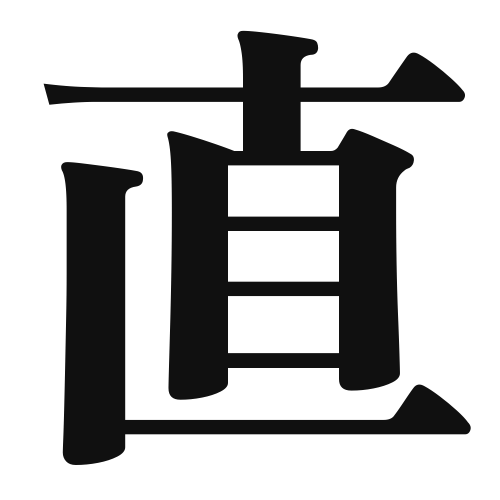1. Overview of Meaning
The kanji “直” (pronounced “choku” or “naoru”) primarily means “straight,” “direct,” or “honest.” It conveys the idea of something being straightforward or unambiguous.
2. Formation and Radical
Formation of the Kanji: The kanji “直” is a phonetic-ideographic character (形声文字). It combines the meaning of “straight” with a phonetic component that suggests its pronunciation.
Radical: The radical for “直” is “竹” (bamboo), which is often associated with flexibility and uprightness, further emphasizing the concept of being straight or direct.
3. Examples of Usage
Common Words and Phrases: Some frequently used words that include “直” are:
- 直線 (ちょくせん, chokusen) – straight line
- 直接 (ちょくせつ, chokusetsu) – direct
- 直す (なおす, naosu) – to fix or correct
Example Sentences in Daily Conversation:
- この道は直線です。 (このみちはちょくせんです。) – This road is a straight line.
- 彼はいつも直に言います。 (かれはいつもじかにいいます。) – He always speaks directly.
4. Synonyms and Antonyms
Similar Kanji: A similar kanji is “正” (せい, sei), which means “correct” or “right.” While both convey a sense of correctness, “直” emphasizes directness and straightforwardness, whereas “正” focuses on accuracy and righteousness.
Opposite Kanji: An antonym for “直” is “曲” (きょく, kyoku), which means “curved” or “bent.” This represents the opposite concept of being straight or direct.
5. Cultural and Historical Background
Relation to Japanese Culture: The concept of “直” is significant in Japanese culture, where honesty and directness are valued traits. It is often associated with integrity and straightforward communication.
Proverbs and Idioms: One common saying is “直言不諱” (ちょくげんふき, choku gen fuki), which means “to speak frankly without reservation.” This reflects the cultural appreciation for honesty and directness in communication.
